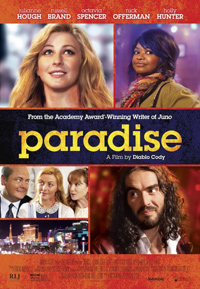No Dashboard Lights: Diablo Cody’s Contrived Directorial Debut
 Arriving with about as much finesse as the plane crash that fatally incinerates its protagonist is Diablo Cody’s directorial debut, Paradise, which the Oscar winning screenwriter also penned. The only curious element is that the film feels like a precursor or sketch of something that would have occurred in Cody’s resume before Young Adult, the 2011 film that saw her reteaming with Jason Reitman for a darkly comedic look at modern female body horror, where inside scars rise profusely to the surface. Whereas Charlize Theron’s beauty queen harpy Mavis’ internalized emotional trauma rumbles like an earthquake from the inside out, this time round we get a burned up Julianne Hough, whose physical deformations cause change from outside on in. As intriguing as Cody’s debut may sound as a sister film to her previous lacerations of feminine identity, her debut feels as if it is actually based on a young adult novel, creating scenarios so adolescently contrived that even moments straining for genuine pathos instead inspire unintentional laughs.
Arriving with about as much finesse as the plane crash that fatally incinerates its protagonist is Diablo Cody’s directorial debut, Paradise, which the Oscar winning screenwriter also penned. The only curious element is that the film feels like a precursor or sketch of something that would have occurred in Cody’s resume before Young Adult, the 2011 film that saw her reteaming with Jason Reitman for a darkly comedic look at modern female body horror, where inside scars rise profusely to the surface. Whereas Charlize Theron’s beauty queen harpy Mavis’ internalized emotional trauma rumbles like an earthquake from the inside out, this time round we get a burned up Julianne Hough, whose physical deformations cause change from outside on in. As intriguing as Cody’s debut may sound as a sister film to her previous lacerations of feminine identity, her debut feels as if it is actually based on a young adult novel, creating scenarios so adolescently contrived that even moments straining for genuine pathos instead inspire unintentional laughs.
Lamb (Julianne Hough), is an ultra conservative young woman living with her strictly religious parents (Nick Offerman, Holly Hunter) in rural Montana. Taking a plane ride with her pilot fiancé, a tragic crash takes his life and leaves her body (not her face, of course) severely burned. A lawsuit against the fiance’s estate brings little Lamb a hefty sum, which leaves her church members chomping at the bit since Lamb will most likely donate the money to the church. However, Lamb’s tragedy has caused a change of heart, which she announces angrily from the pulpit. She no longer believes in that bearded man in the sky, and has vowed to take her money and whoop it up in the city of sin, Las Vegas, where she will drink, wear tight clothes, and dance with homosexuals. Worst of all, she will now vote Democrat.
Jetting off after her speech, Lamb finds herself in the neon lights of Vegas, shocked that girls can be ordered off of little cards handed out on the street. She scoots into a bar tended by overly friendly import William (Russell Brand), and meets a lonely chanteuse, Loray (Octavia Spencer), who is hired to sing upbeat Aretha Franklin songs but instead croons melancholy versions of Radiohead tunes amidst audience derision. Bar patrons remark that Loray surprisingly has no soul, a lazy play on stereotypes for, we all know that a black lady without soul is like a homosexual without wit—a sad thing indeed. The three bond, while William and Loray take Lamb under their wing, showing her the real Las Vegas, leaving behind the strip, which is actually geographically known as Paradise. We learn vague backstories of this motley crew, and a drunken run-in with Amber (Kathleen Rose Perkins), the magical prostitute whose picture is on the card Lamb first sees upon arriving in Vegas, has her learning one of life’s most important lessons—we all have scar, darlin’. And we all have to find our own versions of Paradise, not that monolithic manufactured one.
While Cody dials back her signature isms usually earmarking her cornball dialogue, traces of her severely off mark characterizations are evident in every frame, mostly due to Hough’s omniscient narration, which is extremely grating and childish (Lamb’s mom calls glitter “Lucifer Dust” and quips about Lamb’s fear of acquiring AIDS from hotel dishes falls equally flat). Cody’s writing is simply not sophisticated enough to pointedly critique the religious right, whose insidiously ignorant beliefs are hardly as childishly curtailed as depicted here.
Hough, while beautiful (though unremarkable), seems inept at choosing adequate vehicles in her ascent to relevant stardom as Paradise is every bit as utterly ridiculous as other Hough fare, like Safe Haven. With the exception of the ever animated and effervescent Octavia Spencer, the rest of the supporting cast doesn’t fare any better. With Brand as a lackluster romantic interest, Cody utterly wastes Hunter and Offerman, even with the latter’s remarkably transformed visage. They’re window dressing for the set-up, and conveniently there for loving support after a banal reunion. Frustrating in its incredible lack of authenticity or genuine emotion (that bathroom scene between Amber and Lamb is a doozy), Paradise is a lamb best left to slaughter.


